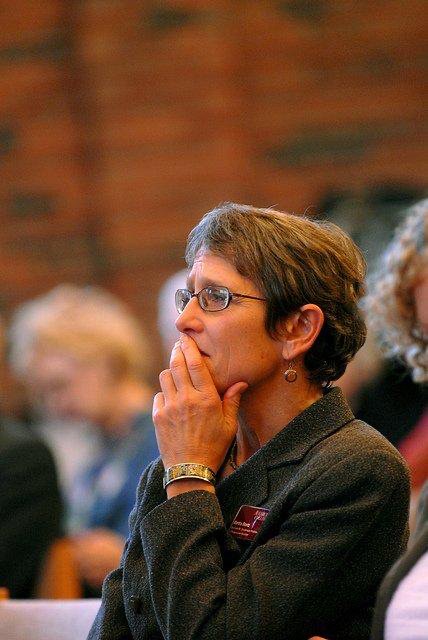“Guess what the first words out of her mouth were?!” I overheard the fragment of a conversation rushing to my gate. Later, as the plane lifted into the clouds, I reflected on the significance of first words. We cherish them like talismans; they promise to unlock a mystery.
In Matthew’s gospel, the Sermon on the Mount inaugurates Jesus’ public ministry, and the first word out of his mouth is the word “blessed.” What a great way to begin a sermon! Jesus repeats this word throughout his first sermon, as if people need to hear it more than once. Through blessing he introduces himself to disciples, telling them who he is.
But Jesus also introduces disciples to themselves, telling them who they will become if they follow him.
Maybe it’s true that even the best preachers have only one good sermon in them, because Jesus’ final sermon echoes his first. Here Jesus talks to “you that are blessed by my Father” (Matthew 25:34). Only this time the disciples are doing the blessing—feeding the sick, giving drink to the thirsty, clothing the naked; and Jesus is the one being blessed. Those whom Jesus blessed in his first sermon now bless others. Blessing inscribes the arc of discipleship in Matthew’s gospel: the blessed become a blessing.
How does all this happen?
To address this question, I read these inaugural blessings in three different ways, then return to Jesus and how the one blessing becomes the one blessed—and who does the blessing at the end of his ministry.
Descriptive and performative speech
Let’s focus on these first words. It’s not prescriptive speech, as in, this is what you should be; it’s descriptive speech, as in, this is who you are. All too often, people read the beatitudes as the Ten Commandments of Christian Discipleship, entrance requirements for the kingdom of God: “Blessed are they…” really means “Thou shalt…,” and disciples had better measure up! When read as prerequisites for recruitment in that army of Christian soldiers, no one can meet the standard.
But Jesus isn’t recruiting; he meets people where they are. The audience for this first sermon sat at his feet like a bunch of broken toys; they yearned to be made whole again. Jesus meets them where they are, because that’s where he is—and that’s where we latter-day disciples are too.
Moreover, these blessings not only describe disciples with a bracing and embracing accuracy, the words themselves begin a transformation. This speech is not simply descriptive; it’s performative. When we say “I promise…,” as we do when we marry or pledge allegiance, we don’t deliver the goods then and there. Instead, we commit to becoming the kind of people who can deliver on the promise over the course of a lifetime. Promising points us in the right direction. Like promising, blessing begins a transformation.
Transformation
A specific transformation follows each blessing, and it’s not generic, one-size-fits-all change, it’s specific to each description. For example, the “poor in spirit,” those presumably needing spiritual resources, will be the ones inheriting the realm of all spiritual gifts, the kingdom of God. “Those who mourn” will find comfort, and indeed, the one who blesses them sends his spirit, “the comforter” (see also John 14:26). The “meek” shall inherit the earth (see also Psalm 37:11), not the powerful or the ones with the most toys. The “pure in heart” will see God, because no tangled desires block the view. And biblical meekness does not signal spinelessness; it knows when to stand up—and when to stand down. After all, Moses, “the meekest man on the face of the earth” (Numbers 12:3), stood up to God for the Hebrew people and stood up to the Hebrew people for God. Each blessing reverses a specific situation; with the blessing, a transformation begins.
Indeed, Jesus signals the transformation, for he himself is the promise all broken people seek, then and now. He sends not just any spirit, but his spirit, the Comforter; he is our peace; he is mercy made flesh; he is God’s son—and he invites everyone into the family. Jesus, God’s blessing made flesh, stands before us.
Martin Luther called this transformation the “happy exchange” (froeliche Wechsel). Jesus takes our conditions into his body and offers his own to us in exchange. The Greek word theosis captures a transformation embedded in the incarnation: God became human, so that we might become divine (Athanasius, “On the Incarnation of the Word”).
Audience: “They, theirs—and YOU”
Finally, pay attention to how Jesus addresses his audience in this first sermon. He seems to be talking about “others” and the transformations “they” will begin to experience. Just when his hearers think this is all about someone else, the final beatitude addresses them directly: “Blessed are YOU!” It’s startling, intentionally so. What’s going on?
Scholars divide these “others” into two categories. The first four beatitudes describe those in need of help: the poor in spirit, those who mourn, the meek, those who hunger and thirst for righteousness (verses 3-6) ; the second four beatitudes describe those who help them: the merciful, the peacemakers, the pure in heart, those who are persecuted for righteousness’ sake. Then, in verse 11, everyone, both the helped and the helpers, are swept up in bracing direct address: “Blessed are YOU….”
It may be that this is Jesus’ version of that old, tired joke that divides the world into two kinds of people. The divisions in his time were cruel: male and female, Jew and Greek, slave and free, righteous and unrighteous. Indeed, the divisions in our own time may even be more cruel: liberal and conservative, black and white, citizen and “alien.” Jesus challenges all these divisions, implying that in the world according to God, the only division that matters is those who need help and those who help them.
And then, in the final blessing, “Blessed are YOU … ” he erases even that distinction. As he experienced in his own body, even and especially those who help others will be persecuted, reviled, targeted, even crucified. There’s only one kind of people in the world—the children of God.
Jesus’ final sermon returns to his first, calling out “YOU that are blessed by my Father.” He details how these blessed ones have become a blessing to others, indeed, how the blessed have blessed even the one who blessed them from the beginning.
We all need blessing, and it comes to us in surprising and unexpected ways, because the blessing of God dwells among us.
“Blessed are You!”
Resources
- Dietrich Bonhoeffer, The Cost of Discipleship (New York: Simon & Schuster, 1959), 105-114.
- Martin Luther, “The Sermon on the Mount,” Luther’s Works 21 (St. Louis: Concordia Publishing House, 1956), 7-61.
- Martha E. Stortz, Blessed to Follow: The Beatitudes as a Compass for Discipleship (Minneapolis: Augsburg Fortress, 2008).

